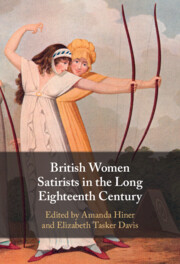Book contents
- British Women Satirists in the Long Eighteenth Century
- British Women Satirists in the Long Eighteenth Century
- Copyright page
- Dedication
- Contents
- Illustrations
- Notes on Contributors
- Acknowledgements
- Introduction
- Part I Traditions and Breaks
- Part II Publicity and Print Culture
- Chapter 6 Women’s Satires of the Literary Marketplace in Eighteenth-Century England
- Chapter 7 Charlotte Lennox, Satirical Poetry, and the Rise of Participatory Democracy
- Chapter 8 Jane Collier’s Satirical Fable
- Chapter 9 Hiding in Plain Sight
- Part III Moral Debates and Satiric Dialogue
- Appendix Selected List of Eighteenth-Century Women Writers and Their Satiric Works
- Selected Bibliography and Guide to Further Reading
- Index
Chapter 6 - Women’s Satires of the Literary Marketplace in Eighteenth-Century England
from Part II - Publicity and Print Culture
Published online by Cambridge University Press: 31 March 2022
- British Women Satirists in the Long Eighteenth Century
- British Women Satirists in the Long Eighteenth Century
- Copyright page
- Dedication
- Contents
- Illustrations
- Notes on Contributors
- Acknowledgements
- Introduction
- Part I Traditions and Breaks
- Part II Publicity and Print Culture
- Chapter 6 Women’s Satires of the Literary Marketplace in Eighteenth-Century England
- Chapter 7 Charlotte Lennox, Satirical Poetry, and the Rise of Participatory Democracy
- Chapter 8 Jane Collier’s Satirical Fable
- Chapter 9 Hiding in Plain Sight
- Part III Moral Debates and Satiric Dialogue
- Appendix Selected List of Eighteenth-Century Women Writers and Their Satiric Works
- Selected Bibliography and Guide to Further Reading
- Index
Summary
This essay looks at satires of the literary marketplace written by three non-elite female poets: Mary Barber (1685–1755), Mary Jones (1707–78), and Elizabeth Hands (1746–1815). Writing outside the urban marketplace and living with heightened financial precarity, these women did not market their volumes directly in a London commercial space. Rather, these poets sold their collections by subscription, cultivating potential patrons, subscribers, and readers through personal connections across provincial, non-London networks. Their rich satires draw on the keenly felt challenges of attracting a sufficient number of subscribers, a process that essentially moves the public literary marketplace into more private, often domestic, space shaped by individual relationships and social networks. A distinctly different kind of literary satire results, one focused on private interactions, particular utterances, and domestic gatherings. This essay examines satiric poems by Barber, Jones, and Hands, and suggests that the female poet’s perspective gained from their proximity produces effective satire both of the specific individuals the women encounter and of the cultural attitudes those individuals represent. Within the very material object marking these women’s success – the published volume in the reader’s hands – these four verse satires document the precarity of their situation and their perilous path to publication by subscription.
Keywords
- Type
- Chapter
- Information
- British Women Satirists in the Long Eighteenth Century , pp. 115 - 132Publisher: Cambridge University PressPrint publication year: 2022

